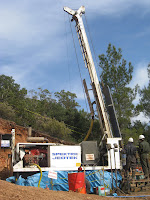What a couple days we had! First a Royal Wedding watched by half of the Globe. Then Obama’s capture of Osama. And finally, for us here in Canada, an election with a scary winner.
Welcome to the world of ambiguity. Wills & Kate look like a nice couple and less fake than most of what has been on display by the British Royals in the last decades. But all this pomp, glitter and archaic ceremony? It’s 2011,folks, wake up! But we still preferred the ecstatic crowds Friday a week ago in London to those in Washington last week Sunday night. A middle-ages inquisition ceremony could not have been jollier - or should we say - barbaric. Osama bin Laden? Certainly a person that has some things to answer for. But do we buy Obama’s ‘brought to justice’ rhetoric? After all, according to many Bin Laden and his movement was largely an American creation in the first place. And then the Canadian election: the Bonsai-George-Double-U Stephen Harper has now a solid majority. He will ‘Americanize’ the country further until it can just apply for becoming the 51st state of those ‘South of the Border’. The same election though gave us also the victory of the centre-left NDP winning the biggest number of seats in history. A bit of pyrrhic victory though.
All in all a minefield for the ethicist. Which provides some space to talk about – why not – mining. In fact that industry has taken our attention here in our School in Toronto over the last couple of months. As it turns out, Schulich will launch later this year a specialization in ‘Mining and Minerals’ on the MBA program. A core topic for this new program in fact will be the social responsibilities and ethics of mining.
Now, that’s a minefield in itself. Our school prides itself on being the leading school in the world in integrating environmental and social issues into business education. How does this go together with getting into bed with the mining industry? An industry which has a fairly dubious legacy with regard to ethics and social responsibility as the main focus of a school focusing exactly on these issues? There was some debate among faculty about this.
For us, this question gave rise to some thinking, too. As academics, we can stay, as one of our colleagues sometimes put it, ‘small and clean’ – or one can get out there, engage with issues, actors and industries which are of big importance and get the hands a little bit dirty. For the time being, the latter approach seems to be more intriguing and rewarding. In the sense that our research and teaching might in fact have an impact on the real world.
Of course a closer engagement with mining surfaces the rather complex nature of the industry. On a recent visit to some goldmines in Turkey we were able to witness these issues from closer up. We visited the area around Canakkale, 3 hours southwest of Istanbul, where currently some substantial explorations in gold mining are taking place. On the one hand, mining can in fact have substantial positive impacts on economic and social development of communities. This of course assumes that mining companies (in this case Australian and Canadian firms) share employment, infrastructure and profits with local communities. The effect can be rather substantial as often mines are located in otherwise not very developed regions. On the other hand, the disruption of the environment and the pollution around mining operations are huge.
The push for responsible mining, as we witnessed on site, is challenged by a number of characteristics of the industry. First, mining in the early, exploratory stages is still pretty much a gamble. Hundreds of millions investment is needed before even the first drop of oil or the first ounce of gold can be mined. This puts a rather tight budget and intense investor scrutiny on the companies and will make extensive voluntary expenses on environmental or other social responsibility issues rather difficult to justify. Second, unlike the big mining MNCs such as Rio Tinto, Glencore or AngloAmerican, the majority of companies are rather small, especially in the early stages of mining. They often simply lack the resources, often also the awareness of managers who mostly have science/engineering backgrounds with little understanding of wider social impacts of mining. Third, and finally, mining predominantly takes place in contexts of rather poor governance and regulation where the immediate pressure on companies to avoid harm to the environment and local communities is rather weak.
This is certainly an educational challenge. One executive we spoke to mentioned, just as an example of the dimensions of social responsibility, that the manager of a large mining project he was involved in in Papua New Guinea is now more or less in charge of half of the GDP of this country. This entails responsibilities beyond just the immediate profitable management of the extracting operations (which is a 24/7 job to begin with). Those managers inevitably assume – whether they know it or not – wider responsibilities for economic, social and environmental development and welfare of a country. We consider this a stark challenge – in education, research and engagement with the industry and their many critics in civil society. We might talk more about mining in this space!


Certainly more to be said about mining, and this is a great start.
ReplyDeleteAs regards Osama Bin Ladan (#obl), I thought this was useful reading http://bit.ly/lRD1QX - top ten myths about the man.
Routledge Editor,
ReplyDeletethanks for the comments, and yes, watch this space.
You are right, the US link to Osama is a bit tenuous, though one could argue that the wider Mudjahedin movement on which he thrived certainly flourished on American Dollars (see the movie 'Charlie Wilson's War'. But the link you gave will come as a relief to the father of one of the authors of this blog: He was NOT an Arsenal fan!